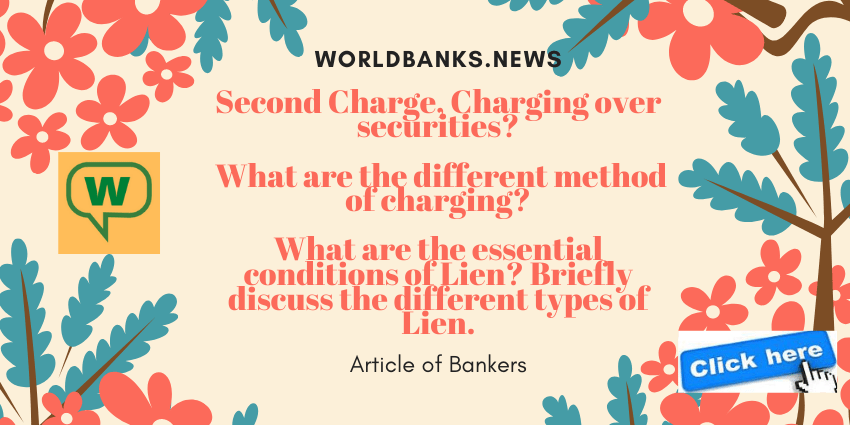Write short notes on the following: Pari Passu Charge, Second Charge, Charging over securities/What matter Bank have to consider before determine the methods of charge against any securities? What are the different method of charging?/What do you mean by Lien? What are the essential conditions of Lien? Briefly discuss the different types of Lien.
-
Write short notes on the following:
Ans. a). Pari Passu Charge: The term usually use in consortium/syndicated finance. In case of such lending, number of Bank’s or financial institutions join together to finance a single borrower in an agreed ratio against a common security. The securities are charged to all the Bankers/financial institutions without any reference like 1st charge/second charge etc. The term that institution will have a pari passu charge over the borrowers assets means that the lenders are entitled to have equal right over the assets as per the agreed share.
b). Second charge: A creditor holding second charge as mortgagee, is entitled to the proceeds after the first is met. Second charge holder, prior creation of charge, must have to inform the first mortgagee regarding creation of second charge & have to obtain his “NOC” as because the first mortgagee can not part with the proceeds or title of the property if he has notice of the second charge.
c). Charging over securities: Charging over securities means making a security available as a cover for an advance. In order to Bank may obtain different form of securities from the borrower. Some of them are moveable, some of them are immovable, possession & control of the immovable security may or may not be remain with the Bank but it has be make sure that, in case of default, security remain available to the Bank to cover the exposure. It is mentionable here that whatever form the charge may be created, Banker does not become the absolute or exclusive owner of the property, he will be able to apply his right in case of default only & his right will remain valid till full adjustment of liability. So, the manner by which some articles or commodities or properties are made available to a Bank as security is known charging of security.
-
What matter Bank have to consider before determine the methods of charge against any securities? What are the different method of charging?
Ans. Charging of security depends on the following : i). The type of security to be charged. ii). Nature of advance iii). The degree of control over the debtors property required by the Bank to secure their exposure. Different methods of charging are :
i). Lien (Section 171 of Indian Contract Act 1872)
ii). Pledge (Section 172 of Indian Contract Act 1872
(iii). Hypothecation (Section 30 of Sale of Goods Act 1930)
iv). Mortgage (Section 58 of Transfer of Property Act 1882)
v). Assignment (Section 130 & 136 of Transfer of Property Act 1882)
vi). Set off .
-
What do you mean by Lien? What are the essential conditions of Lien? Briefly discuss the different types of Lien.
Ans. Lien is the right of one person(Creditor) to retain goods and securities in his possession belongs to other until certain legal debts due to the person(Creditor) retaining the goods are satisfied. Lien does not give power to sale but to retain the goods or property. Three essential condition of the Lien are:
i). The goods/securities/ properties over which Lien to be exercised must be in possession of the creditor who will exercise it.
ii). There must be a lawful debt due to the person in possession of the goods by the owner of goods.
iii). There must not be any contract on the contrary. There are three types of lien. These are:
i). Possessory Lien
ii). Equitable Lien &
iii). Maritime Lien.
i). Possessory Lien: A possessory lien can be exercised only by the person who in possession of the goods/securities. Prerequisite of possessory lien is that the possession should be rightful, continuous & not for any specific purpose. Possessory lien may be lost: * By loss of possession. * When due is paid * Substitution of securities. * When right of lien is waived. Possessory lien are two types, these are:
i). Particular Lien &
ii). General Lien
- Particular Lien: Particular lien is that lien which confers/give the right to retain that particular commodity against which the debt arose. For example: A radio repairer has particular lien on the radio repaired.
- General Lien: A general lien confers right to retain goods and securities not only in respect of a particular debt but in respect of the general balance due by the owner of the goods and securities to the person in possession of them. The right of general lien is specially given by law to :
- i). The Banker
- ii). The solicitor
- iii). Brokers
- iv). Wharfingers
- v). Ware house keepers.
ii). Equitable Lien: An equitable lien is an equitable/fair right conferred by law to a right upon the movable or immovable properties of another until certain specific claims are satisfied. The instances of equitable lien are:
- Where the banker releases the pledged goods to the borrower under a trust receipt that sale proceeds of the goods will be deposited to the loan account. The goods are under equitable lien to the Bank.
- An unpaid vendor of immovable property has an equitable right over the property in full or part until the actual money is paid.
- A partner who pays partnership debt on dissolution, has an equitable lien on the property of the partnership.
iii). Maritime Lien: Maritime lien is a right specially binding a ship, her furniture, machinery, cargo and freight for the payment of claim based upon maritime law. It is given by law to:
- The Master of the ship for seamen’s wages.
- The salvors on the salvaged property.
- To the persons who have suffered losses as a result of collision due to ships negligence. It can be enforced by a legal process by arresting the ship or by proceeding against in the Admiralty court. The lien subsists even if the ship has been sold for valuable consideration to a third party.




















